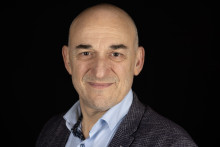I am an enthusiast by nature and try to always be optimistic. Lately, though, that has been hard. The world feels on fire: democratic norms fray, with the president of what used to be one of the examples of democracy saying that he hates his opponents and censors critics. Wars devastate families because some ‘leaders’ undermine the well-being of human beings and engage in destructive imperialistic actions. And public debate often collapses into slogans and suspicion, calling, for example, any expression of dismay about the killing of innocent people – such as children who have nothing to do with terrorism and deserve a life like all other human beings – antisemitic.
In such a climate, many of us search for something steady to hold on to. Some find it in faith. I find it in human love – and in reason.
Drifting from our foundations
For me, academia is not ‘just a job’. It is a way of life: a commitment to truth-seeking, to open debate, and to the slow, shared work of building knowledge. In Spinoza’s sense, it is an attempt to align ourselves with something larger and more enduring than our own egos. That is why the changes I see in universities trouble me so deeply.
Too often, we are drifting from our foundations. Instead of a community of inquiry, the university risks becoming an enterprise optimised for metrics. Bureaucratic burdens grow while adding little to learning or discovery. Decisions flow top-down rather than emerging from collegial deliberation. Those charged with cultivating education and research increasingly answer to dashboards rather than to disciplines. We tolerate practices that exploit junior colleagues for their output while denying them fair credit and real mentoring.
And in teaching, we sometimes prize throughput – pass rates and course evaluations – over mastery, curiosity, and the courage to think. Courses are evaluated not by people that master the subject or able to judge the didactical value connected to the content of the subject. They are valued with ‘the number of passes’ or the ‘methodologies’. Like such things would mean anything about the quality of education at an academic level.
The Humboldtian ideal
This is not the Humboldtian ideal that helped drive the great scientific and cultural advances of the last two centuries. Wilhelm von Humboldt argued that teaching and research must be inseparable, and that scholars deserve trust as stewards of their fields. That model empowered professors to set rigorous standards, to defend unpopular ideas, and to educate students not as clients but as apprentices in a shared craft.
The stakes today are higher than ever. With artificial intelligence accelerating change across every sector, society does not need graduates trained to memorise tricks that machines already perform faster. Society needs thinkers – people who can abstract, model, test, and dissent; who can argue with evidence; who can say the unpopular truth kindly but clearly. If you want to help someone, you owe them honesty. Telling people only what they wish to hear helps nobody in the long run.
Commitments
So what should we do? Here are a few commitments we can make together.
First we could re-center academic freedom and integrity. Protect open inquiry and good-faith disagreement. Reward careful argument over performative certainty: if you want to help somebody, you should tell the truth, because if you tell what the other is pleased to hear, you only help yourself.
We could restore collegial governance. Let decisions about curricula, standards, and research priorities be led by those with subject expertise, in dialogue with students and society.
All decisions should be critical and we should ask ourself weather the consequence of the decision contributes to the mission: reduce administrative drag. Audit processes that siphon time from teaching and research; keep what demonstrably improves them, retire what does not.
Everybody should have the opportunity to go to university, but university is not for everyone and we should not change our quality norm to let it look like it is: value mastery over metrics. Align incentives with deep learning, not just progression rates.
It is time to prioritize the most important values and mentor responsibly. Credit labour fairly, protect early-career scholars, and cultivate intellectual generosity.
We need to encourage a critical culture of openness and respect and to dare speaking-upknowing we can rely on being safe: model civil courage. Encourage staff and students to question, to propose alternatives, and to speak with both conviction and humility.
Choosing a path
I write this not in despair but in hope. Universities can still be places where reason, evidence, and compassion lead the way – where we teach students not what to think, but how to think. If you are fortunate enough to work in academia – especially in a position of leadership – you also carry a responsibility. Use it to defend the conditions under which truth can be pursued: freedom to inquire, time to think, and communities that prefer verified facts to comfortable opinions.
If we choose that path, the university can again be a refuge in turbulent times – not by retreating from the world, but by serving it better.







